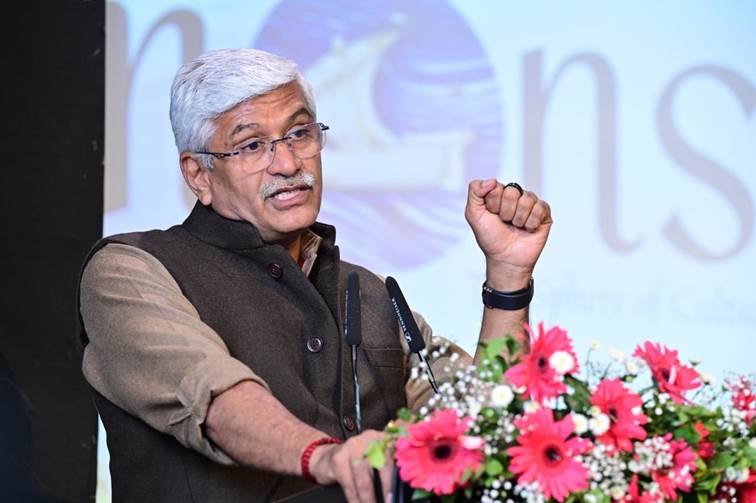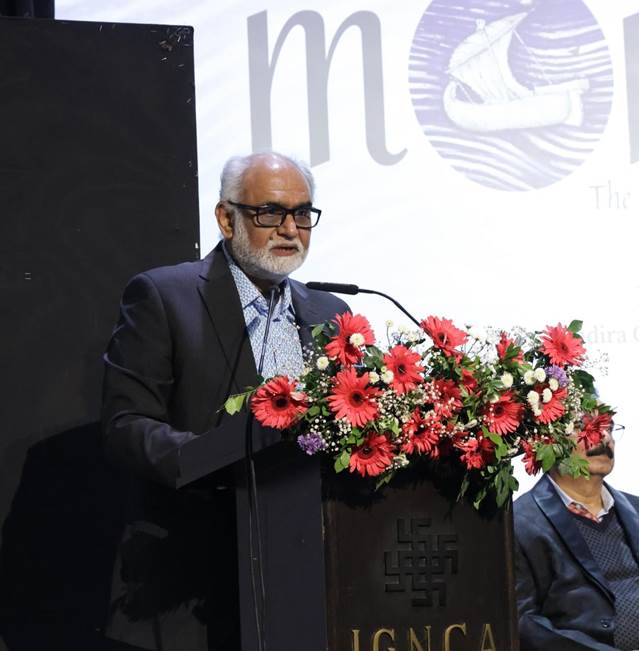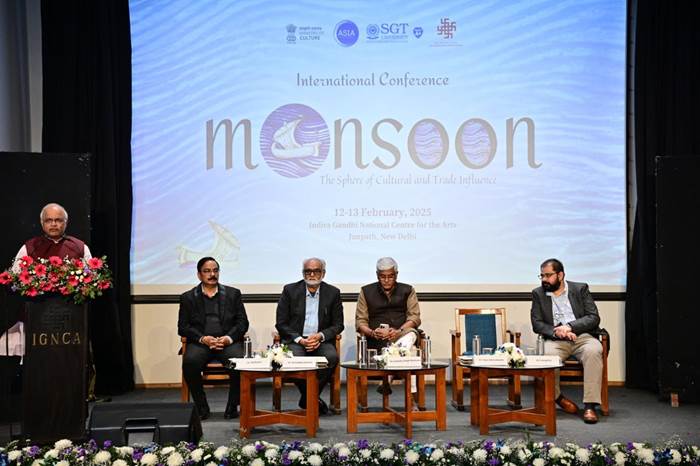Ministry of Culture
India’s Cultural Influence Across the Indian Ocean Region Stems from its rich Cultural, Intellectual and Knowledge Traditions: Union Minister Shri Gajendra Singh Shekhawat
From Ancient Trade Winds to Modern Maritime Security: ‘Monsoon’ Conference Explores India’s Expanding Indian Ocean Role
Posted On:
12 FEB 2025 9:42PM by PIB Delhi
In the backdrop of India’s growing maritime partnerships and security initiatives, the Indira Gandhi National Centre for the Arts (IGNCA) is organizing a two-day international conference in collaboration with the Advanced Study Institute of Asia ( ASIA) at SGT University titled ‘Monsoon: The Sphere of Cultural and Trade Influence’. ‘Project Mausam’, is an Indian transnational initiative under the Ministry of Culture. This conference, exploring historical and cultural connections among Indian Ocean nations through maritime interactions, will highlight India’s central role in shaping trade, traditions, and connectivity across the Indian Ocean Region (IOR). The inaugural session of the conference began today at IGNCA, New Delhi, and will continue until 13th February 2025. Shri Gajendra Singh Shekhawat, Union Minister Minister of Culture and Tourism, graced the occasion as the Chief Guest, with a keynote address by Dr. Vinay Sahasrabuddhe and a welcome address by Dr. Sachchidanand Joshi, Member Secretary, IGNCA. Prof. Amogh Rai, Research Director, ASIA, SGT University, and Dr. Ajith Kumar, Director of Project Mausam, were also present during the inaugural session.

Union Minister of Culture and Tourism, Shri Gajendra Singh Shekhawat, while speaking at the inaugural session, highlighted the deep interlinkages between India and the region, emphasising that India’s cultural influence across the Indian Ocean Region stems from its rich cultural, intellectual, and knowledge traditions. He noted that this influence stemmed not only from commerce and trade but also from India’s intellectual prowess and golden prosperity. He remarked that the footprints of India's cultural impact are visible among those who came as students, monks, or even as aggressors, carrying with them the essence of India’s cultural progress, fostering diversity and unity over thousands of years. He also spoke about the unique vision of ‘Project Mausam’ to showcase a Transnational Mixed Route of Natural and Cultural Heritage, stating, “The world realises that culture is the factor that unites us all.”
The initiative is particularly timely, as India and France recently concluded their Maritime Cooperation Dialogue in New Delhi, agreeing on joint measures to assess and counter threats to maritime security in the IOR. These threats include piracy, maritime terrorism, smuggling, illegal fishing, hybrid and cyber threats, and marine pollution. Oman will also be hosting the 8th edition of the Indian Ocean Conference from February 16-17, focusing on ‘Voyages to New Horizons of Maritime Partnership’. Simultaneously, the Indian Navy’s 2025 capstone Theatre Level Operational Exercise (TROPEX) is underway, showcasing India’s preparedness in the Indian Ocean.

‘Project Mausam’ not only emphasizes India’s historical maritime influence but also resonates with the nation’s evolving geopolitical strategy in the region. The conference will focus on key themes such as ancient navigational routes, port city networks, and coastal settlements. By integrating tangible and intangible cultural heritage, the project highlights India’s continued leadership in fostering connectivity and maritime partnerships, contributing to UNESCO’s maritime heritage studies.

Dr. Vinay Sahasrabuddhe in his address emphasised the cultural foundations of India-Southeast Asia relations, calling for intellectual and emotional investment to integrate Southeast Asia into India’s popular consciousness. Noting that cultural bonds need revitalisation, he highlighted the monsoon as a symbol of enduring connections and urged moving beyond Eurocentric perspectives. He advocated deepening cultural engagement through the Act East policy to ‘Attract East’ by strengthening cultural, strategic, and economic ties. He also called for reinforcing Dharma-Dhamma relations, reviving shared epics, promoting collaborative art and craft, advancing educational and technological exchanges, addressing climate change, and building linguistic bridges.
Dr. Sachchidanand Joshi said that IGNCA’s area studies in South and Central Asia led to the development of Vrihattar Bharat to explore cultural routes and linkages, expanding beyond the initially identified 39 countries. He noted that over 70 countries share cultural heritage with India. Emphasising international cooperation, as reflected in the G20 summit’s motto, ‘Vasudhaiva Kutumbakam’, he highlighted that IGNCA’s efforts were ongoing, with the conference serving as a catalyst to expand these studies.
Prof. Amogh Rai expressed his views on the monsoon as both a physical and cultural force, highlighting its role as a cultural multiplier and the conference's potential for further research. Dr. Ajith Kumar concluded the inaugural session by extending a formal vote of thanks and emphasising the cultural unity between India and Southeast Asian countries.
IGNCA’s international conference aims to foster deeper cultural diplomacy, with academic collaborations and heritage conservation paving the way for future policy dialogues. This dialogue aligns seamlessly with India’s evolving maritime strategies and international partnerships.
***
Sunil Kumar Tiwari
pibculture[at]gmail[dot]com
(Release ID: 2102534)
Visitor Counter : 1624